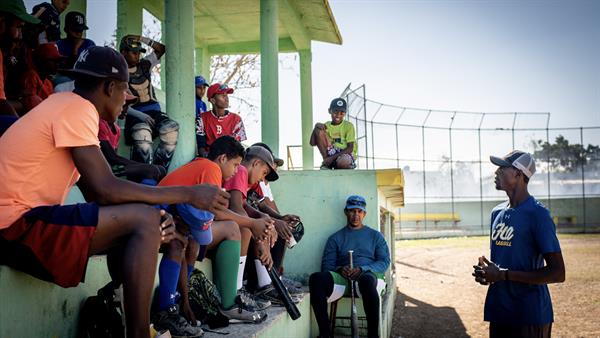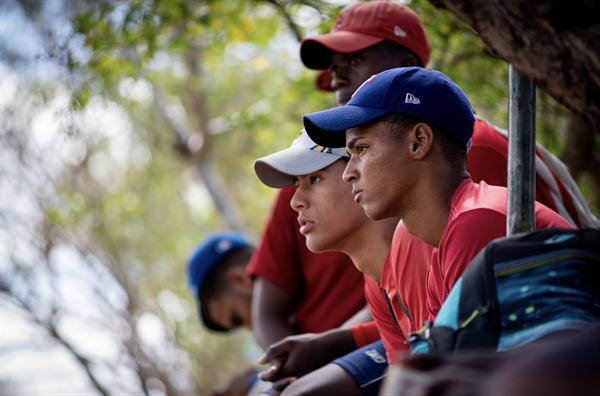For the past two years, Miguel and Rosy Terrero have been working side-by-side as a dynamic duo within a group of FCA Dominican Republic’s steadily growing leaders. But the road to Higuey was anything but a straight path.
Rosy, for instance, always marvels at the fact that she works for FCA.
“I have zero sports background,” she laughed. “I’m an administrator. That’s my strength. That’s my specialty.”
That’s not all Rosy brings to the sports ministry table. A native of Michigan, she traveled every winter from the ages of nine to 16 with her parents for short-term trips to Guatemala. Rosy learned the language and the culture, and following high school graduation, she continued her education there during an 18-month internship.
Then in 2015, Rosy moved to the Dominican Republic to work with an anti-trafficking program. She had no idea how radically her life was about to change. Four months into her tenure there, Rosy met Miguel—a former up-and-coming baseball player turned FCA representative in Boca Chica.
Miguel’s story is quite a bit different. At the age of 20, an arm injury ended his burgeoning pitching career. Miguel wasn’t a strong Christian at the time, but God used his exit from baseball to bring him into a stronger relationship with Jesus Christ. That led to an encounter with Mike Shaheen who had just moved to the Dominican Republic to start FCA there. Miguel got into one of Mike’s Huddle groups and not long after was offered the chance to work for the ministry.
“Until then, I didn’t know that sport was the tool that God would use to give me the chance to minister to others,” he said. “I didn’t even know that was a possibility.”

Miguel and Rosy were married a little over a year after they met. Rosy took a year away from her anti-trafficking work and joined efforts with Miguel at FCA, a position she thought would be temporary. They’ve worked as a team ever since.
A few months before getting married, Miguel moved from Boca Chica to Higuey to begin FCA in a new region of the Dominican Republic. In the beginning, he knew less than a handful of coaches. Developing relationships with the coaches was the key to ministry success.
“We get to know a coach, and then we ask if we can share the Gospel with his athletes,” Miguel explained. “They’re always very open. And then they give us the opportunity to start Huddles. And then we ask the coach if it’s okay if we share the Gospel more personally with them apart from the team. So we keep on talking with the coach as the weeks go on. It’s all about relationships and helping the coaches. We’ll take the coach out to eat and invest in him personally. Once there’s a trust that’s been established, we start pulling him into our coach’s Huddles as well. We’re praying with them and for them and asking about their families.”
Miguel now has 15 coaches with whom he’s currently discipling along with 20 more with whom he’s developing a relationship.
“It’s very organic,” Rosy added. “One coach will lead you to another coach. The goal is to have the coaches take over the role of chaplain to their teams. The first step is to help the coach, and they watch us do the ministry. The second step is the coach helps us while we do the ministry. The third step is they do the ministry, and we help them. It’s that concept of multiplication.”
Recently, Miguel reaped the spiritual reward of a two-year effort when one of his coaches accepted Christ.
“One of the keys was inviting him to our house and taking him out for lunch and breakfast and getting to know him more in that environment and not just on the field,” Miguel said. “You can show up to the field, but they will see you differently if you can get more intimate with them and show them that you’re the same person in the home that they see on the field.”

That commitment allowed Miguel to help the coach break some bad habits and addictions. When asked why he finally decided to become a Christian, the coach simply replied, “I’ve never seen so much peace and so much joy than in those who have received Christ.”
But it doesn’t just end there. In fact, the 12 FCA Dominican Republic staffers have made a concerted effort to disciple the coaches and athletes within their circle of influence. Rosy and Miguel have been especially excited to see stories emerge like a coach named Francisco who was a Christian but never felt compelled to share the Gospel with others until he started meeting with Miguel. After going through FCA resources and watching Miguel in action, Francisco was no longer the quiet guy hanging in the background but rather a bold, outspoken messenger for Christ.
“I was with Francisco’s wife at one of her doctor’s appointments,” Rosy said. “She started talking about how different he was now. Even though he’d been a Christian for 20 years, now he was opening the Bible in the home and sharing what he was learning with the family. He was witnessing to his neighbors and to his players. He had never done that before.”
“Both Rosy and Miguel have a ministry mindset and are committed to serve together as a couple,” FCA Executive Director of International Ministry Dan Britton said. “They have such a strong commitment to discipleship and the concept of disciples making disciples—athletes discipling athletes and coaches discipling coaches.”
While Miguel’s baseball resume gives him instant credibility with the coaches and athletes, Britton acknowledged that Rosy’s administrative skills and experience with short-term international trips has been another key to the ministry’s success.
Miguel and Rosy, along with their teammates throughout the country, have helped FCA Dominican Republic grow at a rapid rate. In seven years, the ministry has impacted over 6,000 athletes and coaches through camps and a combined 218 Huddles s for coaches and teams. There are also around 160 coaches that are being mentored including several that are being trained to become chaplains for their teams.
Britton saw the entire staff in action this spring at the Dominican Republic’s seventh annual sports camp, which featured baseball and basketball training for 140 campers and was led by 40 coaches and staffers.
“They’re working on replicating what’s going on in some key cities and developing more staff to take ownership so that more replication can take place,” he said. “They are engaging, equipping and empowering coaches to make disciples.”
The efforts of multiplication include more outreaches for coaches and a continuing plan to disciple coaches who will then disciple other coaches. And some of those coaches will become volunteers and even staff for the ministry—just like Miguel.
“That really excites me,” Rosy said. “This is what we’re here for.”